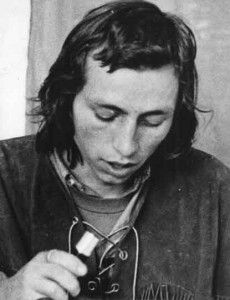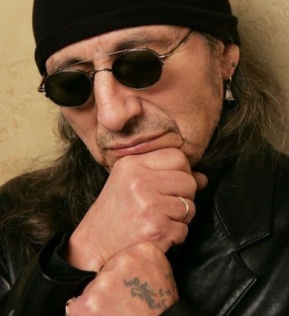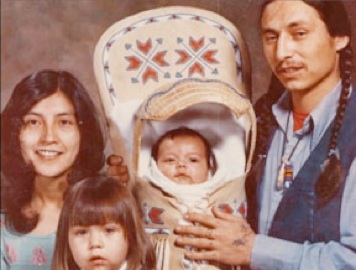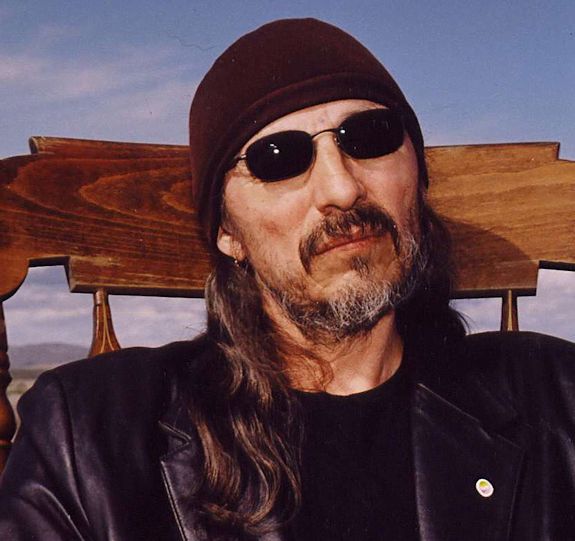On December 8, 2015, American Indian activist, spoken word artist and poet, actor and visionary John Trudell walked on surrounded by his family and friends at his home in Santa Clara County, California, after a battle with cancer. He was 69.
John Trudell, Born Feb. 15, 1946, Died December 8, 2015
John Trudell serve in the Navy during the Viet Nam war. After his tour in the military, he studied radio and broadcasting at a community college in San Bernardino, California. It was there he joined a group called the United Indians of All Tribes.
The Activist

John Trudell at Alcatraz
In 1969, he joined other American Indians from the United Indians of All Tribes group, who had occupied Alcatraz Island in San Francisco Bay to demand that the former federal prison be given to Native Americans under treaty rights.
Trudell, then in his 20s, emerged as the group’s spokesman, frequently delivering a broadcast called “Radio Free Alcatraz” and speaking at news conferences.The protest eventually dwindled, and the last demonstrators were removed by federal officers after 19 months.
“If this is the land of the free,” Mr. Trudell said during the occupation of Alcatraz, summarizing the issue that would propel his life and work from then on, “we want to know why we don’t have the respect and dignity that all free men are accorded by other free men.”
Mr. Trudell went on to serve as national chairman of the American Indian Movement (A.I.M.) from 1973 to 1979, a turbulent stretch in the relationship between Native American activists and the federal government. His FBI dossier from that era called him “extremely eloquent and therefore extremely dangerous.”
His tenure began after the episode at Wounded Knee, S.D., where, in February 1973, Oglala Lakota from the Pine Ridge reservation, incensed by tribal corruption, and American Indian Movement activists, protesting the government’s treatment of their people, occupied the town in a 71-day standoff with federal marshals and F.B.I. agents.
Bob Robideau, Darelle Butler and Leonard Peltier were prosecuted in the killing of two F.B.I. agents during a confrontation in Oglala, S.D., two years later.
 John Trudell was “the most eloquent speaker in the Movement,” as Peter Matthiessen wrote in his 1983 book about the siege, “In the Spirit of Crazy Horse
John Trudell was “the most eloquent speaker in the Movement,” as Peter Matthiessen wrote in his 1983 book about the siege, “In the Spirit of Crazy Horse.” He held community meetings in Cedar Rapids, Iowa, where the trial of Mr. Robideau and Mr. Butler was held, and he testified for the defense. The two men were acquitted. Mr. Peltier, who first fled to Canada to avoid prosecution and was tried separately, was convicted and remains in prison.
But well before that, Mr. Trudell had already made a name for himself as an effective champion of his people, decrying the indignities they had suffered for more than a century at the hands of the American government.
In November 1972, he was among the leaders of a group that occupied the Bureau of Indian Affairs in Washington, demanding the enforcement of historical treaties that granted Native Americans sovereignty over their land.
In 1979, Mr. Trudell burned an American flag on the steps of the F.B.I. building in Washington, saying that the flag had been desecrated by the government’s behavior toward American Indians and other minorities, and that burning was the appropriate way to dispose of a desecrated flag.

John Trudell’s whole family was killed in a fire
The next day his inlaw’s home in Nevada, where his family was staying, was burned to the ground. His pregnant second wife, Tina Manning, their three children and his mother-in-law were killed in the fire on the Duck Valley Indian Reservation. Mr. Trudell and others long suspected government involvement, but the cause of the fire was never determined.
<p”It left me even angrier than I was, and I was never too calm to begin with,” he later told the New York Times. “Between the years 1979 and 1984, I drove 250,000 miles. I just ran it out.”
The Author
Mr. Trudell began to distance himself from the American Indian Movement after the fire at his house, and in the 1980s, he turned to writing.
He published several volumes of poetry, including “Stickman: Poems, Lyrics, Talks ” and “Lines from a Mined Mind
,” often writing in protest of corporate power and government oppression.
The Poet / Musician
In his later years, Mr. Trudell drifted away from Indian activism and took up environmental advocacy and anti-nuclear energy causes. He also took to poetry, calling poems his “hanging-on lines,” and he put his words to music initially in collaboration with Jesse Ed Davis, an American Indian guitarist who had worked with Bob Dylan and singer Jackson Browne.
After Davis died in 1988, Mr. Trudell said Dylan encouraged him to continue as a solo artist.
“He told me that what I was doing with music was revolutionary,” Mr. Trudell told the New York Times. “And he said to stay with it, don’t change a thing, stay after it. That was encouraging because there were definitely some stretches that were like looking down a long tunnel. I’m basically a starving artist, but that’s got to change.”
 Mr. Trudell combined spoken words and music on more than a dozen albums, including one released earlier this year titled Wazi’s Dream
Mr. Trudell combined spoken words and music on more than a dozen albums, including one released earlier this year titled Wazi’s Dream. His fans included Kris Kristofferson, who paid tribute to Mr. Trudell with the 1995 song “Johnny Lobo,” a tune Kristofferson still frequently performs live.
John Trudell was born in Omaha, Nebraska on Feb. 15, 1946. His father was Santee Sioux, and his mother, the former Ricarda Almanza, was of Mexican-Indian descent. She died when John was a boy. Mr. Trudell grew up partly on the Santee Sioux Reservation after his mother died.
His first marriage ended in divorce around the time of the Alcatraz protests. Mr. Trudell later had a relationship with Marcheline Bertrand, the mother of actress Angelina Jolie, before her 2007 death from cancer. She was an executive producer of a 2005 documentary about him called “Trudell.”
He is survived by a brother, Roger, and several children and grandchildren.
The Actor
Mr. Trudell acted in several movies, including “Thunderheart” (1992) starring Val Kilmer and “Smoke Signals” (1998) starring Adam Beach. He also appeared with his friend Steven Seagal in “On Deadly Ground” (1994).
The Environmentalist
In 2012, Mr. Trudell and singer Willie Nelson co-founded Hempstead Project Heart, which advocates for legalizing the growing of hemp for industrial purposes as a more environmentally sound alternative to crops used for clothing, biofuel and food.


